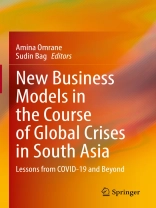To survive and sustain businesses during such times of crisis becomes difficult for managers and entrepreneurs. This in turn amplifies the importance of designing new flexible and adaptive business models. This book addresses different business situations that occur during national and global crises, such as the COVID-19 pandemic. Specifically, it proposes new and inspiring business models for various industries such as service and retail industry using different statistical software like SPSS and AMOS. It discusses the various changing elements of businesses such as the application of artificial intelligence (AI) and machine learning and how to cope with these unexpected business elements to maintain sustainable development.
Innehållsförteckning
Chapter 1: Behavior of Faculty during COVID-19 Lockdown: A Study of Higher Education in India.- Chapter 2: Self- Leadership and innovative behaviour: a study on academicians during the COVID-19 crisis.- Chapter 3: Engagement of Higher Education Teachers’ during Covid19 pandemic in India.- Chapter 4: Business Continuity in COVID-19 Pandemic: A Global Review.- Chapter 5: Brand and product preferences among post-millennial consumers during Act-Of-God Periods.- Chapter 6: The Indian market of online business at risk: The main impacts of the active Corona virus.- Chapter 7: Driving Digital Transformation for Competitive Distinctiveness: The Case of Saregama Carvaan 2.0.- Chapter 8: Business opportunities for small firms through the digital platform in the post -COVID era.- Chapter 9: Pandemic Effect and Remedial Business Model in Micro, Small and Medium Enterprises – A Study in India with special reference to West Bengal.- Chapter 10: Mergers and Acquisitions-A key Revival strategy during the Covid-19 times.- Chapter 11: Effectiveness of working capital management on MSME sustainability in West Bengal.- Chapter 12: Application of Machine Learning (MI) in the Human Resource Management area.- Chapter 13: Deendayal Antyodaya Yojana-National Rural Livelihood Mission (DAY-NRLM) and Tribal livelihood promotion: An Indian experience in pre-post COVID-19 pandemic era.- Chapter 14: How microcredit supports the employability in the new normal era? A study on rural backdrop of India.- Chapter 15: Post Covid-19 challenges and economic development through micro, small and medium enterprises in India.
Om författaren
Amina Omrane is Associate-Professor, habilitated to supervises researches in the Department of Management Science in the Faculty of Economic Sciences and Management at the University of Sfax, Tunisia. She is also a researcher affiliated to the research center of economics and business strategies at IHEC school- in Carthage, Tunisia. She also authored six books in management science, entrepreneurship and human development and actively participated in many international conferences and events.
Sudin Bag is Assistant-Professor and former Head in the Department of Business Administration at Vidyasagar University, in West Bengal, India. His areas of interest include marketing management, services marketing, research methodology, consumer behaviour and international marketing. Dr. Bag has published many book chapters and research papers in reputed national and international journals. He has also conducted various project sessions of several webinars and international conferences.












